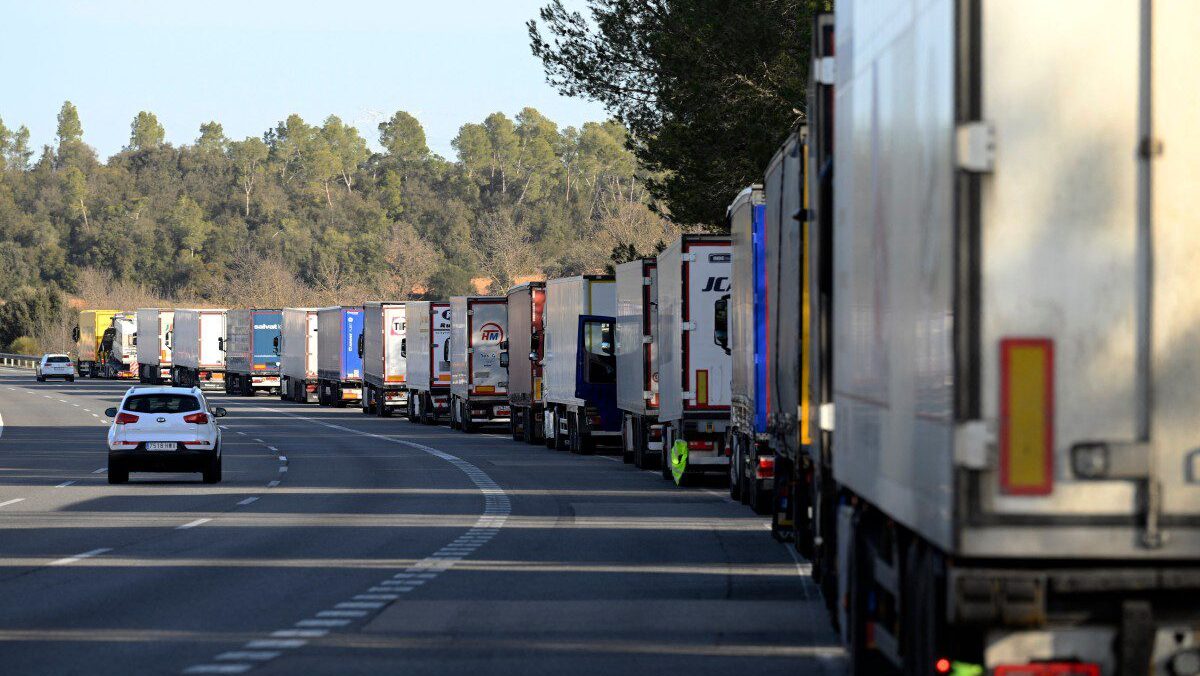
Trucks parked on the hard shoulder line up along the AP-7 motorway, close to Vilajoan, 35km from the French border, due to a blockade by French farmers stopping the import of Spanish wine and fruit. Spanish farmers are set to join the spreading European farmer protest next week.
Photo: by Josep LAGO / AFP
Spanish farmers are joining their European colleagues in taking to the streets to protest their difficult situation and voice their rejection of policies coming both from national governments and the European Union.
Pedro Barato, president of the largest farmers’ union in the country, Asaja, announced on Spanish media on Monday that provincial chapters of the association had already begun to plan local protests and that the national board was meeting later in the week to plan a national protest. He also said that they were working with Copa-Cogeca, the European farmers’ organization based in Brussels, to coordinate with farmers in other EU countries, particularly France, Italy, and Portugal, and plan a demonstration in either Brussels or Strasbourg that would include farmers from across the bloc.
Farmer protests have heated up again in recent months starting in the east with Poland and Romania and spreading to Germany, France, and soon Spain.
French farmers have been blocking the entry of Spanish wine and fruit into the country for weeks. They allege they face unfair competition from the other side of the Pyrenees because Spanish farmers are subject to looser environmental regulations. Spanish farmers vehemently deny the charges, pointing out that all farmers in the EU are subject to the same basic standards. Barato also said on Spanish television that in Italy and France, the governments have approved around 80 products for agricultural use, while Spanish farmers have a mere 31 at their disposal.
At the same time, Spanish farmers are raising their own concerns about facing unfair competition due to the increased imports of agricultural products from Morocco, South Africa, and Egypt. They are also protesting policies coming from Brussels, namely a decrease in subsidies, and an increase in regulations stemming from environmental policies and the push for digitalization of the sector. According to market analysis, Spanish exports of produce increased by 5% from 2022 to 2023 but imports from outside Europe increased by 19%, a tendency in line with patterns throughout the bloc.
🍊📈 🔍🍊 ¡Echa un vistazo al comportamiento de las importaciones de cítricos!
— Asaja Nacional (@AsajaNacional) January 29, 2024
Incremento del 22,1% en importaciones con 1.76 M t. Naranjas y pequeños cítricos lideran el crecimiento. Sudáfrica , el mayor proveedor. Estos son los datos: 🌱https://t.co/Gvlkpg1pJ8 pic.twitter.com/np5PSx8MXl
SOS Rural, an organization that says it “defends the activities of the rural world,” has announced protests in cities throughout the country on February 6. Both Asaja and SOS Rural have also said that they are planning a national demonstration in Madrid in May.
